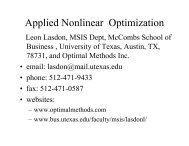[PDF] ALIO Back Matter
[PDF] ALIO Back Matter
[PDF] ALIO Back Matter
You also want an ePaper? Increase the reach of your titles
YUMPU automatically turns print PDFs into web optimized ePapers that Google loves.
MB12<br />
3 - Optimization of Piece-wise Linear Functions<br />
Andreas Griewank, Humboldt-Universität zu Berlin,<br />
Unter den Linden 6, Berlin, 10099, Germany,<br />
griewank@mathematik.hu-berlin.de, Felix Dalkowski<br />
The continuous approach to mine planning leads naturally to piecewise linear<br />
discretizations. Such problems are always semi-smooth and can be solved by<br />
suitable bundle type methods. We present a new methodology based on automatic<br />
piece-wise linearization of in the spirit of automatic differentiation.<br />
■ MB12<br />
Aula 363- Third Floor<br />
Issues in Supply Chain Management<br />
Cluster: Supply Chain Management<br />
Invited Session<br />
Chair: Frank Y. Chen, The Chinese University of Hong Kong, Systems<br />
Engineering & Engineering Mgmt, Shatin, N.T., Hong Kong - PRC,<br />
yhchen@se.cuhk.edu.hk<br />
1 - Dynamic Rental Contract Design for Wholesale Stores at an<br />
Electronic Outlet Center<br />
Xiuli Chao, Professor of Industrial and Operations Engineering,<br />
University of Michigan, 1205 Beal Ave, Ann Arbor, MI, 48109,<br />
United States of America, xchao@umich.edu, Jian Chen, Yifan Dou<br />
We consider the rental contract renewal problem in which the outlet’s management<br />
needs to design an annual rental contract for the wholesale store managers to<br />
maximize its profit. We design a rent contract for the outlet center based on models<br />
of asymmetric information, in which the outlet store provides flexibility to the<br />
individual stores in selecting a rental contract using publicly available information<br />
for the entire outlet center.<br />
2 - On the Structural Analysis of Inventory Problems with<br />
Inventory-dependent Demand<br />
Frank Y. Chen, The Chinese University of Hong Kong, Systems<br />
Engineering & Engineering Mgmt, Shatin, N.T., Hong Kong - PRC,<br />
yhchen@se.cuhk.edu.hk, Yi Yang<br />
We consider how inventory should be managed when inventory affects sales in a<br />
periodic review setting. Models to be analyzed include those with a general demand<br />
function (by which demand varies with the stocking or displayed quantity) and a<br />
general cost structure. Capitalizing on our prior experience gained in related<br />
inventory-pricing control problems, we are able to establish structural results for<br />
these models.<br />
3 - Managing Capacity in a Build-to-order Environment<br />
Melda Ormeci Matoglu, Ozyegin University, Faculty of Econ. & Bus.<br />
Admin., Istanbul, Turkey, Melda.Ormeci@ozyegin.edu.tr,<br />
John Vande Vate<br />
We model managing capacity in a BTO environment as a Brownian drift control<br />
problem. With a practical restriction we model it via a structured LP and show an<br />
optimal solution to the restricted problem can be found among a special set of<br />
policies. We exploit new relationships between complementary dual solutions and<br />
relative value functions to obtain a lower bound on the avg. cost of any<br />
nonanticipating policy. We show that our LP approach is asymptotically optimal for<br />
the unrestricted problem.<br />
■ MB13<br />
Aula 364- Third Floor<br />
Integrated Planning and Forest Road Investments<br />
Cluster: Supply Chain Management in Natural Resources<br />
Invited Session<br />
Chair: Mikael Frisk, Skogforsk, Box 3, Savar, SE-91821, Sweden,<br />
mikael.frisk@skogforsk.se<br />
1 - Solving the Indirect Covering Tree Problem Heuristically:<br />
An Application to Forest Road<br />
David Meignan, Post-doc, Polytechnique Montréal, Campus de<br />
líUniversité de Montréal, 2500 chemin de Polytechnique,<br />
Montréal, QC, H3T 1J4, Canada, david.meignan@polymtl.ca,<br />
Jean-Marc Frayret, Gilles Pesant<br />
An optimization problem arising in forest road construction is to plan new harvest<br />
roads. This road network must cover several areas at minimum cost and consider a<br />
maximum skidding distance. The problem is expressed as an indirect covering tree<br />
problem. It consists in determining a tree that covers a set of vertices so as to<br />
minimize the service and construction costs. A GRASP metaheuristic is proposed.<br />
Computational results are reported on randomly generated and real instances.<br />
<strong>ALIO</strong> / INFORMS International – 2010<br />
58<br />
2 - Integrated Harvest Planning and Biomass Distribution<br />
Satyaveer Chauhan, Assistant Professor, Concordia University, JMSB,<br />
1455 De Maisonneuve Blvd. West, Montréal, QC, H3G 1M8, Canada,<br />
sschauha@alcor.concordia.ca, Sophie D’Amours, Luc LeBel<br />
We consider a two echelon supply management problem where forest contractors<br />
are interested in developing harvesting plan based on the demand of high-quality<br />
fiber as well as biomass (fuel) products. The selection of harvesting blocks depends<br />
upon the availability of the fiber, availability of the product mix, transportation and<br />
production costs. This paper presets an integrated model with a solution approach.<br />
3 - Optimization to Support Forest Road Investment Strategies<br />
in a Changing Climate<br />
Mikael Frisk, Skogforsk, Box 3, Savar, SE-91821, Sweden,<br />
mikael.frisk@skogforsk.se, Mikael Rönnqvist, Patrik Flisberg<br />
The forest road network is influenced by the climate, especially rainfall and thaw<br />
causing accessibility problems. A difficult task is to decide which investment in the<br />
road network that gives the highest return, taken into account future harvesting,<br />
changes in climate and also how road investments can interplay with timber storage<br />
and the use of CTI. We present an optimization model which gives answers to<br />
which roads to upgrade, how much timber to store and how CTI-trucks is optimally<br />
used.<br />
■ MB14<br />
Aula 365- Third Floor<br />
Retail Operations<br />
Cluster: Game Theory and its Applications<br />
Invited Session<br />
Chair: Marcelo Olivares, Assistant Professor, Columbia University,<br />
Uris Hall, Room 417, New York, NY, 10027, United States of America,<br />
mo2338@columbia.edu<br />
1 - Dynamic Pricing and Customer Relationships: Selling to Learn or<br />
Learning to Sell?<br />
Rene Caldentey, Associate Professor, NYU Stern, New York, NY,<br />
United States of America, rcaldent@stern.nyu.edu,<br />
Paulo Rocha e Oliveira, Gabriel Bitran<br />
Knowing each customer’s preferences enhances a firm’s ability to design and offer<br />
the right selection and configuration of products and services. We use an axiomatic<br />
approach to develop a learning model that enables us to quantify the trade-off<br />
between the value and the cost of knowing the customers. This learning model is<br />
used to investigate how pricing policies can be used to speed up the learning process<br />
while maximizing the firm’s financial performance.<br />
2 - Predicting Out of Stock using Transactional Data for a<br />
Supermarket Chain<br />
Luis Aburto, CERET, Departamento de Ingenieria Industrial,<br />
U. de Chile, laburto@dii.uchile.cl, Claudio Pizarro, Trinidad Figeroa<br />
POS transactional data is a dynamic and precise source of information which reflects<br />
product turnover in retail shelves and changes in product demand, useful to predict<br />
Out of Stock (OOS). This project builds a decision tree model to forecast OOS for a<br />
supermarket using transactional data. Using KDD methodology we built several<br />
classification models to predict OOS likelihood at sku-day level, using product<br />
demand data and its fluctuation in time, as well as suppliers and product<br />
characteristics.<br />
3 - The Effect of Waiting Time on Customer Purchases:<br />
An Empirical Study<br />
Marcelo Olivares, Assistant Professor, Columbia University, Uris Hall,<br />
Room 417, New York, NY, 10027, United States of America,<br />
mo2338@columbia.edu<br />
This paper studies empirically how customer delays in a supermarket affect<br />
customer purchases. We collected data on queue lengths using video-cameras and<br />
image recognition. These data were matched with point-of-sale data to estimate the<br />
effect of expected delays on sales. We also provide some insights on how these<br />
results can be used to optimize staffing decisions.


![[PDF] ALIO Back Matter](https://img.yumpu.com/17932960/38/500x640/pdf-alio-back-matter.jpg)
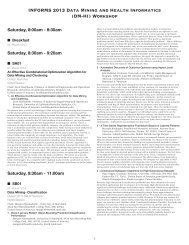
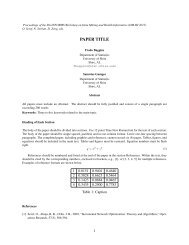
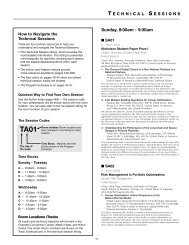
![[PDF] Charlotte Back Matter](https://img.yumpu.com/17933057/1/190x245/pdf-charlotte-back-matter.jpg?quality=85)
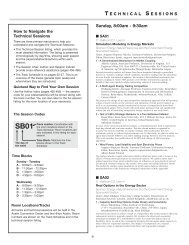
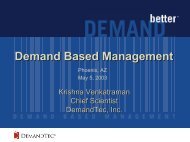
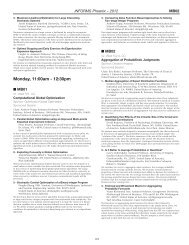

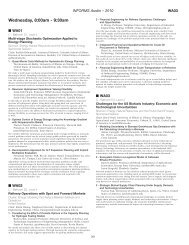
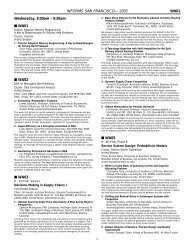
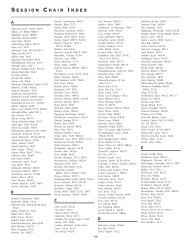
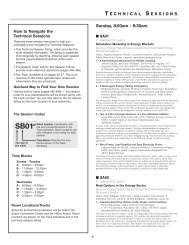
![[PDF] Monday, 8:00am - 9:30am](https://img.yumpu.com/17932954/1/190x245/pdf-monday-800am-930am.jpg?quality=85)
